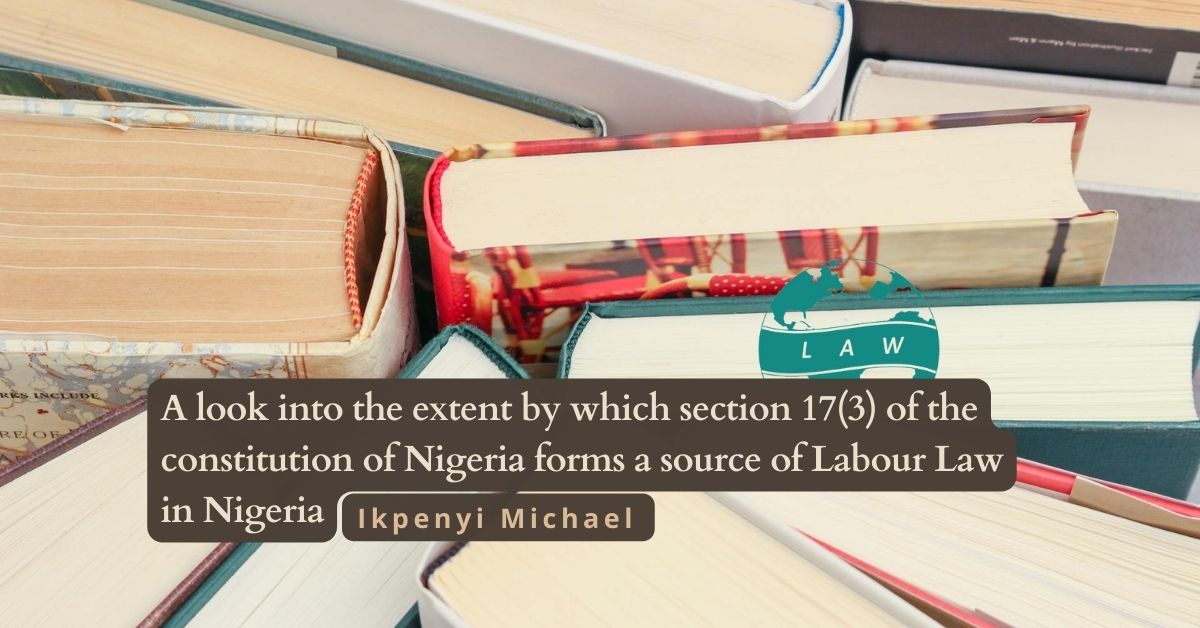A look into the extent by which section 17(3) of the constitution of Nigeria forms a source of Labour Law in Nigeria
Labour Law is that aspect of the law that governs the relationships that exist between and/or among the major parties in the labor industry.
These major parties include; the employee (s), the trade union of the employee (s), the employer (s), the employer (s), the federal government, and the state government.
Naturally, as these parties relate with each other conflict of interest sometimes arises. The labor laws regulate the actions of each party.
Laws on work hour pay, sick pay, holiday pay, method of the contract of employment termination, etc make up the labor law.
By sources of labor law, we consider the various origins or places or actions that give rise to laws in the labor terrain.
Amongst other sources of law, section 17(3) of the constitution forms an essential source of our labor law. We will briefly discuss the extent to which the above section forms a source of our labor law.
Section 17(3) a-e provides thus;
The State shall direct its policy towards ensuring that-
(a) all citizens, without discrimination on any group whatsoever, have the opportunity for securing adequate means of livelihood as well as adequate opportunity to secure suitable employment;
(b) conditions of work are just and humane, and that there are adequate facilities for leisure and social, religious, and cultural life;
(c) the health, safety, and welfare of all persons in employment are safeguarded and not endangered or abused;
(d) there are adequate medical and health facilities for all persons:
(e) there is equal pay for equal work without discrimination on account of sex, or on any other ground whatsoever;
Essentially, the above section purports to ensure that every qualified citizen is gainfully employed without any form of unjustified discrimination; that employees’ contract of employment is reasonably just; and that workers are not enslaved on the altar of work while ensuring that adequate facilities for leisure and social, religious, and cultural lives are provided for, which is in furtherance of the intent of section 38 of the constitution.
Furthermore, it also mandates employers to ensure the safety and welfare of their employees with adequate medical and health facilities in the event of a work accident.
Additionally, workers’ remunerations must be fair and equivalent to the workers’ input. The section clamors for social justice, fairness in the distribution of economic rewards, the administration of improved employment policies, provision of employee welfare, security, power to bargain, etc.
It is the duty and responsibility of all organs of government and of all authorities and persons exercising legislative, executive, or judicial powers to confirm, observe, and apply the injunctions provided for under the section[1].
However, section 17(3) is not an enforceable right as it falls under the ouster provision.
The question therefore becomes, how then does the section form a source of labour law?
Now, chapter 2 of the constitution under which section 17(3) falls entrenches the provisions known as “Fundamental Objectives and Directive Principles of State Policies[2]”. According to the Constitution Drafting Committee, “Fundamental Objectives” comprise ideals towards which Nigeria is expected to strive while “Directive Principles” are set down policies or paths which should be pursued to realize the national ideals.
This goes to say that the extent to which the section forms a source of Nigerian labor law is dependent on the extent to which all persons or authorities exercising legislative power make enactments to ensure the achievement of the purpose and intent of the section.
This is further given credence by the provisions in item 60 of the exclusive legislative list which empowers the National Assembly to enact any of the provisions in Chapter 2 into law.
Conclusively, although the rights, if they may be so called, provided by section 17(3) are not justiciable rights[3], they however provide a legal framework and a significant yardstick by which the reasonableness, or perhaps constitutionality, of labor law in Nigeria may be measured.
[1] Section 17(3) constitution of Federal Republic of Nigeria 1999 (as amended)
[2] Chapter 2 of the constitution
[3] section 6(6)(c) of the constitution
About Author
Michael Ikpenyi is passionate law student with vigor and enthusiasm for the legal profession. He is an ardent reader, researcher and an exceptional writer. He has an unusual enthusiasm for human rights and social justice, litigation, academics, intellectual property, etc.



Leave a Reply